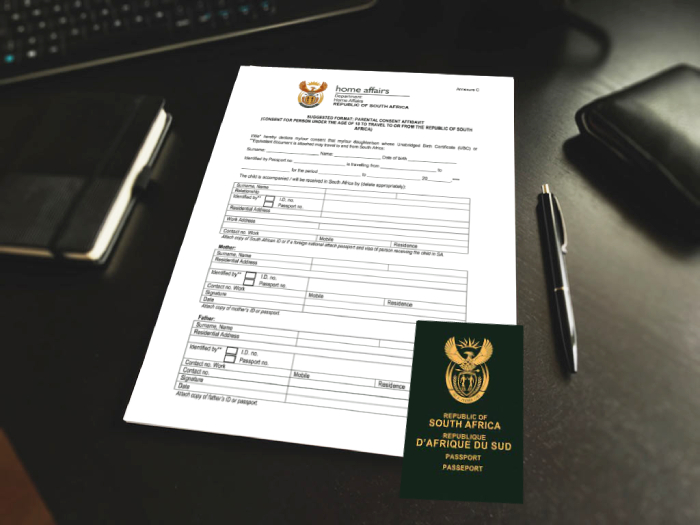
Parental Consent Letter - Cape Town

A Parental Consent Letter, sometimes referred to as a Parental Consent Affidavit or Child Travel Consent Form, is a legal document that gives permission for a child to enter or travel outside South Africa alone, with a parent or other guardian.
As a result of growing concerns for the safety of minor children, new child travel regulations were introduced by the South African Department of Home Affairs on 1 June 2015 in an effort to combat child trafficking. These regulations apply to both South Africans and foreign nationals and mean that travellers will be required to produce additional documentation in addition to passports and visas (where applicable) when entering or leaving South Africa with children under the age of 18.
The Parental Consent Letter is part of the documentation. This letter is usually required by the South African Immigration Department to prove that the child has the consent of their parents or legal guardians to travel and that the child will not be abducted or taken out of the country without their knowledge or consent.
A Parental consent letter usually includes the following information:
• The child’s full name and date of birth
• The name and contact information of both parents (or guardians)
• The trip information, such as the destination country and dates of travel
• The name and basic information of the accompanying person who will be taking care of the child while abroad
This letter will need to be signed and dated by you, and also notarised. If there are two parents giving permission, they must both sign. Then the letter should be apostilled. It is a legal document, and to make it all above board and entirely right, having it apostilled means that there is no chance that it won’t be accepted.

10 Frequently Asked Questions About The Apostille
Service In South Africa
Gathering the proper paperwork to get an apostille in South Africa can be confusing. We understand that working with the government and the all necessary paperwork can feel overwhelming. But don’t worry; we are here to answer your questions regarding the apostille process. We are asked a lot of questions and wanted to share some with you
A Parental consent letter demonstrates that children who travel alone, with only one parent/guardian, friends, relatives or a group (e.g. sports, school, musical, religious) have permission to travel in/outside of South Africa from every parent (or guardian) who is not accompanying them on the trip
There are many situations in which a minor may need a travel consent form:
• The child is traveling alone.
• The child is traveling accompanied by just one parent.
• The parents are traveling separately for a portion of the trip.
• The child has a different last name from his or her parents.
• The child is traveling with a group, school, sports teams, social groups, etc.
Yes, as of 1 June 2015, it is a legal requirement for children under the age of 18 to carry a letter of consent when travelling in/out of South Africa.
All airlines and travel agency in South Africa can provide you a sample of a Parental Consent Letter. You can also search online for a sample. The letter should include travel dates, your name, the name of the child, the person the child will travel with, the country the child will travel to, passport numbers, and the return date. You will want to put as much information as possible include airline information.
There is no South African requirement to have the consent letter witnessed by a notary public. However we strongly recommend doing so, as South African border officials will be less likely to question the authenticity of the letter.
There is no South African requirement to have the letter of parental consent apostilled, but many embassies and overseas authorities do require an apostille certificate for it at the time of application.
The Apostille certificate is an official government issued certificate attached to public documents so these documents can be valid for use internationally. The Apostille was introduced as an alternative to the old and long legalization process through The Hague Convention of October 5, 1961.
Any country that is a member of the Hague Convention will accept an apostille certificate from South Africa without further legalisation.
If you apply for our standard service we can legalise your document in 2-4 working days. We also offer a Express apostille service. Read about it here
In most cases, yes. Depending on the document, you may need an original sent to us or there are times we can work with a copy. But it is usually not a problem to receive your apostille on a South African document, no matter where in the world you are located.
Global-Apostille offer fast, efficient and seamless service to meet your expectation. Client confidentiality as paramount and endeavour to provide a first class service to our clients. To find out more about our fast and reliable document legalisation service.
Contact us at:
Tel
+27 12 348 3134
Cell
+27 81 347 6060
info@apostillelegalisation.co.za
Drop us a message







